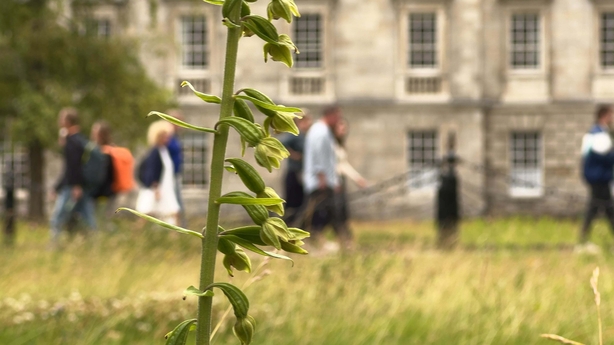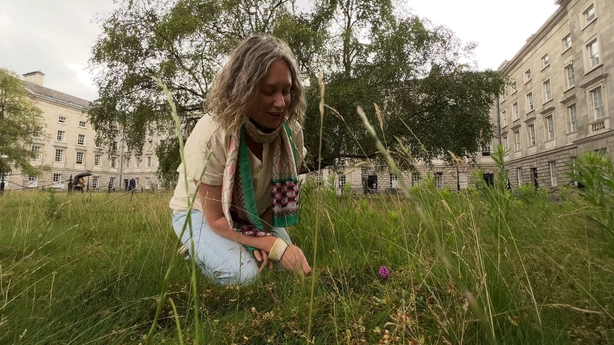Two species of orchids have been discovered growing on the campus of Trinity College in Dublin city centre, much to the surprise and delight of botanists.
The wild plants - a broad-leaved helleborine and a pyramidal orchid - have popped up in a lawn next to Trinity's iconic Front Arch.
Inspecting the 60cm broad-leaved helleborine, Professor Jennifer McElwain, from TCD's School of Natural Sciences, said: "It's absolutely remarkable. Botanists are known to get excited about plants, but we really did get excited about this one. It's really unusual to find this orchid anywhere. It's rare. It's extra unusual to find it in the middle of Trinity, right in Front Square, in the middle of the city."

There are around 30 different species of wild orchids in Ireland.
Some thrive in fields, others prefer bogs, woods or mountains.
Professor McElwain believes the appearance of the orchids in Trinity are the result of the university's participation in 'No Mow May' - the annual campaign that encourages gardeners to not mow their lawn during the month of May so that plants and pollinators benefit.
"We wanted to implement a positive measure for biodiversity. So, we just simply stopped mowing this lawn in May. And that was difficult to do, because a lot of people really like finely cut lawns. But we stopped mowing, and this wonderful orchid began to emerge.
"And there's not just one - there are three orchids, including another species. So, we actually have an orchid-rich meadow.
"That's a botanist's dream and our only intervention has been to stop mowing the lawns."
Orchids have the smallest seeds of all flowering plants, with a typical seed the size of a speck of dust.
"A seed could have blown in by wind. It could have come in on the feet of people, or been brought in by a bird," Professor McElwain explained. "Alternatively, this seed could have been in this lawn for decades. Underground, just waiting for the right conditions to allow nature to thrive. And the right conditions in this case happened to be not mowing the lawns."

Flower-rich, grassland habitats are rapidly disappearing from the island of Ireland and one third of our wild bees are threatened with extinction.
Trinity installed wildflower meadows on College Green in 2020 after thousands of students, staff and members of the public voted to replace the manicured lawns at the front entrance to the university with the more nature-friendly alternative.
Professor McElwain hopes the appearance of orchids in Front Square will further encourage people to do their bit for biodiversity.
"I think this a really hopeful demonstration that biodiversity and nature can thrive if we just give it time and space. We are in the midst of biodiversity and climate crises. It can seem overwhelmingly complex to solve it, but it's our responsibility to show what's possible.
"In this lawn alone, more than 35 plant species have come up. And if you think each one of those plant species supports one or two species of pollinators, that's 90-odd species. If this lawn was a mown, clipped lawn, you would have a species diversity of one.
"This demonstrates how simple measures can lead to really spectacular results. Never in our wildest dreams did we expect this," she said.







